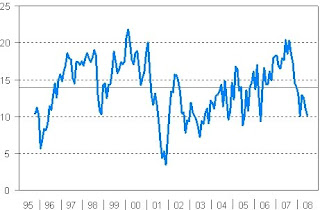
"In June, consumers' expectations concerning Finland's economy were the gloomiest since the end of 1990.
At the same time their assessments about their own economic situation were also the most cautious since summer 1997.
Nevertheless, consumers continued to regard their own employment prospects and saving possibilities as good. June was NOT regarded a favourable time for making major purchases or for raising a loan, in particular.
In addition, inflation was predicted to continue accelerating clearly."
Let's look at some major index component :
1- Favourable time to raise a loan at present (index) :
20.4(average since 95) 42.0(max) -20.8(min) -5.8 (May) -20.8 (June)
From the index, it's very interesting to note the sharp deterioration for raising loan in June. I think its the record since the statistics started in 1995.
This is not the typical slowdown witnessed in 2003, but it's a much more serious. You wonder how the consumers, this time, will support the economy by taking huge debt.
This support has vanished. Small banks will struggle if not collapse in the year to come.
Merger and acquisition will accelerate in that area (the targeted one : Noa, Tapiola, Aktia, etc.. ). They will not survive surging funding cost and a faltering consumer loan demand at a time when the ECB cannot reduce interest rates.
2- Finland's economic situation in 12 months time :
5.2 (average) 21.7 (max) -17.0 (min) -14.3 (May) -17.0 (June)
Again the same story ,a record low for the Finnish view on the economy. Although one has to be cautious in those kind of figure.
The reality on the ground seems completely different. For example, try to book a Holiday abroad, we will see that almost all destination from any travel agency have all been booked.
Same apply for restaurants, they are all packed, people even queuing to get a place. I'm not even talking about the number of SUV appearing every day on the road (looks like a petrol at 140$ is not high enough to change people habit, or make them more "green": they are not whatever nonsense reports that are spread in the wire time to time. Commercial or Materialistic values still dominate today's world, older and more noble values are all but vanishing bit by bit...)
It might be the type of data you have at the end of the cycle, lots of contradiction , up and down, lots of confusion: signaling the end of the boom.
Have a look in the technical analysis done last February, the gloomy scenario seems to show its head, but too early to say... : consumer confidence technical analysis










